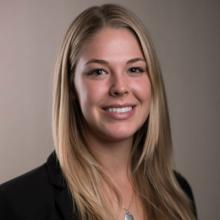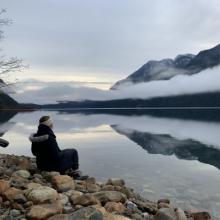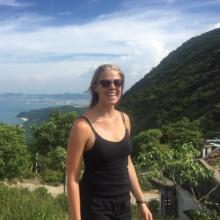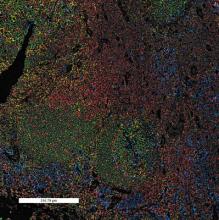Laura Stankiewicz
Why did you decide to pursue a graduate degree?
A dominating theme during my undergraduate degree was me realizing how many fascinating questions in science and engineering are currently unknown and remain to be discovered. Pursuing graduate studies has allowed me to dive deeper into these open questions, learn what problems we have the technical capabilities to tackle, and begin to contribute to our current knowledge with my own work.
Why did you decide to study at UBC?
UBC is one of the top research institutes in the country for my research field of Stem Cell and Regenerative Medicine. I am extremely privileged to be surrounded by world-class professors, students, and research facilities. Also, Vancouver is a beautiful, active city - the ocean and mountains were calling!
What is it specifically, that your program offers, that attracted you?
I love the interdisciplinary focus of the UBC Biomedical Engineering program. I'm a strong believer that incorporating diverse perspectives and knowledge is necessary to drive innovation of health technologies. My program is designed to expose students early on to the intersection of engineering and medicine, and prepare them with a common language to communicate big ideas between seemingly diverse fields of research.
What was the best surprise about UBC or life in Vancouver?
How many like-minded, motivated peers I've met, and how collaborative my research building is! Everyone is always extremely generous with their time and are very willing to train new, naive students in the lab.
What aspect of your graduate program do you enjoy the most or are looking forward to with the greatest curiosity?
I really enjoy being able to share all the novel and exciting research coming out of my labs, and others at UBC, in a way that's tangible for the public. UBC research is driving advancements in technologies and therapeutics that aim to have widespread, positive impacts on health care. I love that my program exposes us to diverse aspects of biomedical research so that we can understand trends in the field and can begin to search for new innovations.
What do you see as your biggest challenge(s) in your future career?
As a graduate student working in both an engineering and a discovery-based biology lab, I've realized the importance and difficulties associated with communicating technical information between experts in different fields of research. I foresee a constant theme in my career to be breaking these barriers and pursuing a common language between seemingly diverse fields of science and engineering so that we can continue to foster interdisciplinary research.
How do you feel your program is preparing you for those challenges?
Practice makes perfect! Since coming to UBC I've had ample opportunities to practice my public speaking in front of various audiences, whether during lab meetings, class seminars, or the UBC 3 Minute Thesis Competition.
What aspects of your life or career before now have best prepared you for your UBC graduate program?
My engineering undergraduate degree at Queen's University taught me two essential skills I needed to succeed in graduate school: how to learn independently and how to work effectively in groups. My thesis work requires a constant balance of independent research and collaboration with my lab members.
What do you like to do for fun or relaxation?
I try and spend as much time as possible outdoors, preferably in the sunshine. Since coming to UBC I've learned to row and have joined the UBC varsity rowing team. This has been an amazing way to meet students outside of my program, to test my time management skills, and to compete in a new sport. On my weekends I try and explore at least one new place with my friends, whether that's a new restaurant, hiking trail, or a quiet place to read.
What advice do you have for new graduate students?
Get curious, get excited, and don't worry too much about the details! Graduate studies must be primarily motivated by your own curiosity and enthusiasm. However, I was nervous coming to UBC because I didn't have a particular research area of interest that I wanted to pursue. This year I've discovered that as long as you are open-minded and willing to learn, your mentors are there to guide and support you in the synthesis of your project.



